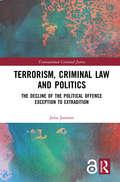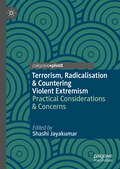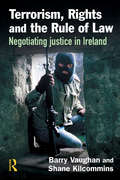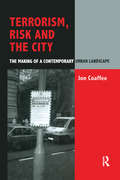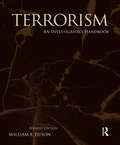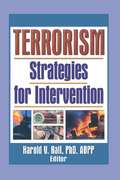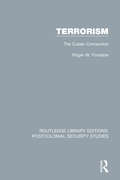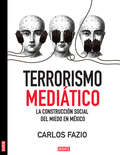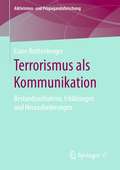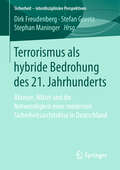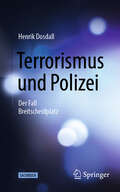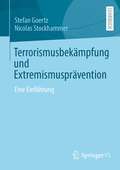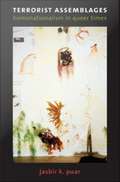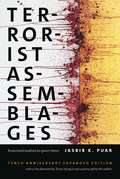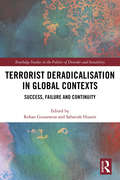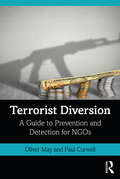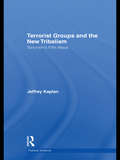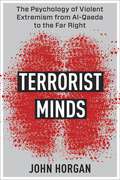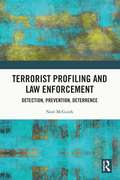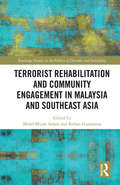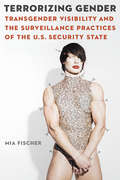- Table View
- List View
Terrorism on Trial: Political Violence and Abolitionist Futures
by Nicole NguyenA landmark sociological examination of terrorism prosecution in United States courts Rather than functioning as a final arbiter of justice, U.S. domestic courts are increasingly seen as counterterrorism tools that can incapacitate terrorists, maintain national security operations domestically, and produce certain narratives of conflict. Terrorism on Trial examines the contemporary role that these courts play in the global war on terror and their use as a weapon of war: hunting, criminalizing, and punishing entire communities in the name of national security. Nicole Nguyen advocates for a rethinking of popular understandings of political violence and its root causes, encouraging readers to consider anti-imperial abolitionist alternatives to the criminalization, prosecution, and incarceration of individuals marked as real or perceived terrorists. She exposes how dominant academic discourses, geographical imaginations, and social processes have shaped terrorism prosecutions, as well as how our fundamental misunderstanding of terrorism has led to punitive responses that do little to address the true sources of violence, such as military interventions, colonial occupations, and tyrannical regimes. Nguyen also explores how these criminal proceedings bear on the lives of defendants and families, seeking to understand how legal processes unevenly criminalize and disempower communities of color. A retheorization of terrorism as political violence, Terrorism on Trial invites readers to carefully consider the role of power and politics in the making of armed resistance, addressing the root causes of political violence, with a goal of building toward a less violent and more liberatory world.
Terrorism, Criminal Law and Politics: The Decline of the Political Offence Exception to Extradition (Transnational Criminal Justice)
by Julia JanssonRecent atrocities have ensured that terrorism and how to deal with terrorists legally and politically has been the subject of much discussion and debate on the international stage. This book presents a study of changes in the legal treatment of those perpetrating crimes of a political character over several decades. It most centrally deals with the political offence exception and how it has changed. The book looks at this change from an international perspective with a particular focus on the United States. Interdisciplinary in approach, it examines the fields of terrorism and political crime from legal, political science and criminological perspectives. It will be of interest to a broad range of academics and researchers, as well as to policymakers involved in creating new anti-terrorist policies.
Terrorism, Radicalisation & Countering Violent Extremism: Practical Considerations & Concerns
by Shashi JayakumarThis book brings together research that covers perspectives and case studies on terrorism, radicalisation and countering violent extremism (CVE). Written by experts involved in these issues at the grassroots, the book bridges the academic-practitioner gap in the field. The proliferation of academic studies and conferences devoted to these subjects has meant that policymakers and practitioners in the same fields sometimes struggle to digest the sheer volume of academic output. The same critical questions keep coming up, but it is debatable the level to which there have been tangible improvements to our real state of knowledge: knowledge in especially in terms of what “best practices” exist in the field (and what can be translated, versus what approaches remain context and location specific). Written in an accessible manner for the general interested reader, practitioners, and policymakers in the field, this volume comprises edited versions of papers presented at CVE workshops run by the Centre of Excellence for National Security (CENS) at the S.Rajaratnam School of International Studies (RSIS), Nanyang Technological University, Singapore, in 2016 and 2017.
Terrorism, Rights and the Rule of Law
by Barry Vaughan Shane KilcomminsThe rule of law is becoming a victim of the struggle against terrorism. Many countries are reviewing their security procedures and questioning whether due process rights hinder them in the war on terror. There is increasing emphasis on preventive detention or strategies of disablement that cut into the liberties of suspects who may not have committed a crime. The focus of this book is the Republic of Ireland, where the risk of political violence has constantly threatened the Irish state. To ensure its survival, the state has resorted to emergency laws that weaken due process rights. The effects of counter-terrorism campaigns upon the rule of law governing criminal justice in Ireland are a central feature of this book. Globalization has supported this crossover, as organized crime seems immune to conventional policing tactics. But globalization fragments the authority of the state by introducing a new justice network. New regulatory agencies are entrusted with powers to control novel risks and social movements adopt a human rights discourse to contest state power and emergency laws. The result of this conflux of actors and risks is are negotiation of the model of justice that citizens can expect. Terrorism, Rights and the Rule of Law contributes to current debates about civil liberties in the war on terror, how counter-terrorism can contaminate criminal justice, and how globalization challenges a state-centred view of criminal justice. It will be of key interest to students of criminology, law, human rights and sociology,as well as legal and other practitioners and policy-makers.
Terrorism, Risk and the City: The Making of a Contemporary Urban Landscape
by Jon CoaffeeThe development of defensive strategies encompassing the fortification and privatization of the city has attracted significant attention during recent years, and has become particularly relevant in the aftermath of September 11th. Dealing with issues of risk, security and the spatial restructuring of contemporary western cities, this book examines how the perceived risk of terrorist attack led to changes in the physical form and institutional infrastructure of the city of London during the 1990s when the city was a prime terrorist target. The book analyses how the various formal and informal strategies adopted in the City attempted to reduce both the physical and financial risk of terrorism. This was undertaken through a series of place-specific security initiatives and risk management policies which led to increased fortification, a substantial rise in terrorism insurance premiums, and, changing institutional relations at a variety of spatial scales. It also argues that the security measures deployed were developed not in terms of an anti-terrorist effort, but in relation to the unintended by-products of these approaches such as crime reduction and enhanced traffic management capabilities.
Terrorism: An Investigator's Handbook
by William E. DysonThis handbook introduces the reader to the field of terrorism investigation. Describing how terrorists operate and how they differ from other criminals, it provides an outline of how terrorism investigations should be conducted. By helping investigators to develop skills and knowledge, this guide helps them to prepare prosecutable cases against terrorists.
Terrorism: Strategies for Intervention
by Harold Hall VAn essential resource for anyone working against terrorism in any form it may take! Written for threat assessment professionals in the post-9/11 era, this timely book will help you understand the motivation to commit acts of terror, the thinking patterns common to many terrorists, the psychology of Muslim fundamentalists, methods for predicting the likelihood of chemical/biological attacks, and a great deal more. You&’ll learn about hostage/barricade situations and the role of the crisis negotiator, including victim/perpetrator psychology and factors that indicate progress is being made in a crisis negotiation and factors that imply imminent lethality. After reading Terrorism: Strategies for Intervention, you&’ll have a better understanding of: biological, social, and psychological constructs that are important to understanding group violence the role of emotions in violence the history of chemical/biological weapons use from 1978 to the present, and methods of predicting the likelihood and origins of such attacks the importance of concurrent sequences in relation to chemical/biological attacks hostage/barricade situations, the makeup of crisis negotiation teams, and the role of the crisis negotiator hostage incident databases-where to find them, what they contain, and how they can be used effectively six different types of hostage takers and what strategies have the best chance of bringing each type&’s crises to an end factors that indicate progress is being made in a crisis negotiation and factors that imply imminent lethality ethical concerns for forensic consultants when dealing with the issues surrounding terrorism Here is a sample of what you&’ll find in this informative and well-referenced book: "Terrorism as Group Violence" illustrates the complexity of terrorism and the need to consider the interplay of biological, social, and psychological influences on terrorist behavior. This chapter identifies the constructs and data generated by theories of violence that are relevant to terrorism. Next, profiles of terrorists&’ motivations are scrutinized, followed by a probing of the specific patterns of thinking salient to their motivations. Finally, approaches to solving the terrorist problem are framed. Five handy tables make important points easy to access and understand. "Chemical and Biological Violence: Predictive Patterns in State and Terrorist Behavior" is essential reading for any serious evaluator of chemical and biological weapons. This chapter uses the Lethal Violence Sequence as a means to help predict chemical/biological weapons use by religious and ethno-nationalist terrorist groups. It includes case vignettes, data categories that can help make predictions more accurate, and a discussion of solutions for use by individuals, law enforcement and federal anti-terrorist agencies, as well as manufacturers and other industry entities, plus a consideration of government and international efforts. "Negotiating Crises: The Evolution of Hostage/Barricade Crisis Negotiations" examines multiple ways by which a crisis incident can be classified, analyzes the results of hostage incident databases, discusses negotiation techniques, and explores the impact of captivity on the victim. The author reveals important characteristics of hostage/barricade situations that can be vital to the success of the evaluator/negotiator. Six informative tables in this section make statistics and procedures easy to understand. "Ethical Concerns in Forensic Consultation Regarding National Safety and Security" provides an essential overview of the ethical challenges that mental health professionals and behavioral scientists face when they consult on matters of national security and safety. This chapter delivers useful guidance for professionals who
Terrorism: The Cuban Connection
by Roger W. FontaineFirst published in 1988, Terrorism: The Cuban Connection examines Cuba’s involvement in terrorism. With a focus on Havana, the book begins by looking at Cuba’s history and the origins of terrorism. As it progresses, the book traces the development of terrorism and explores Cuba’s connections with other parts of the world, including America, Russia, the Caribbean, South America, the Middle East, and Sub-Saharan Africa. Terrorism: The Cuban Connection is a detailed study, equipped with a wealth of key documents and photographs.
Terrorismo mediático
by Carlos FazioEn la línea de obras de pensamiento crítico radical como La doctrina del shock, de Naomi Klein, en este libro Carlos Fazio analiza de manera exhaustiva el fenómeno de la construcción social del miedo e investiga cómo se ha ejercido el arte de la desinformación y la propaganda mediática en la historia reciente de México. Una obra desafiante que pone el dedo en una de las llagas del convulso inicio del siglo XXI: el uso de los medios de comunicación para distorsionar la opinión pública y respaldar los intereses económicos y políticos de ciertos grupos de poder. "Si todos los medios dicen que algo es verdad, es verdad, incluso si es falso" Contra esa sentencia, este libro ofrece un análisis inteligente y arriesgado que desmonta las múltiples estrategias para manipular que ejercen los medios de comunicación. Tras desarrollar conceptos clave como "propaganda", "censura" o "guerra psicológica", Carlos Fazio aporta elementos puntuales para entender cómo los poderes fácticos imponen sus cuestionables agendas ideológicas y obligan a que las personas adopten una conducta determinada.Un revelador examen de la "guerra contra el terrorismo" de George W. Bush le sirve al autor como marco teórico para reinterpretar diversos acontecimientos de la historia reciente de México a partir de una clave fundamental: la construcción social del miedo. Así, se abordan casos emblemáticos que van desde el golpismo mediático suscitado por el asesinato de un conductor de televisión -pasando por la huelga de la UNAM, el intento por desaforar al líder nacional de la izquierda o los sucesos de 2006 en Oaxaca y Atenco- hasta la militarización del país por medio de la lucha contra el crimen organizado. Por último, Fazio, siempre resistente a los usos y las costumbres del poder, hace un contundente diagnóstico del estado de cosas en la que denomina "la república de Televisa", donde han quedado a la vista las miserias de un sistema político controlado por la dictadura del rating y el poder del dinero.
Terrorismus als Kommunikation: Bestandsaufnahme, Erklärungen und Herausforderungen (Aktivismus- und Propagandaforschung)
by Liane RothenbergerKommunikationstheorien und Terrorismus – wie lässt sich hier eine Verbindung schaffen? Terrorismus ist ein in der heutigen Zeit dominantes Thema: Es bestimmt zuweilen die öffentliche politische Diskussion wie auch private Gespräche. Die Kommunikationswissenschaft kann dazu beitragen, das Phänomen Terrorismus weiter zu durchdringen, und wichtige Puzzlesteine liefern, es in seiner Gesamtheit zu erfassen. Die Entwicklung der Medienkompetenz mancher Terroristengruppen drängt es geradezu auf, das „Gesellschaftsproblem Terrorismus“ mithilfe einer „kommunikationswissenschaftlichen Brille“ anzugehen.
Terrorismus als hybride Bedrohung des 21. Jahrhunderts: Akteure, Mittel Und Die Notwendigkeit Einer Modernen Sicherheitsarchitektur In Deutschland (Sicherheit - Interdisziplinäre Perspektiven Ser.)
by Dirk Freudenberg Stefan Goertz Stephan ManingerIn diesem Sammelband untersuchen Wissenschaftler und Praktiker aus dem Politikfeld Innere Sicherheit die asymmetrische Bedrohung durch den islamistischen Terrorismus in Deutschland und leiten daraus eine dringend erforderliche Anpassung der deutschen Sicherheitsarchitektur ab.Der InhaltDas Bedrohungspotenzial durch Islamismus und islamistischen Terrorismus ● Islamistisch-terroristische Radikalisierung ● Recht als Grundlage und Schranke staatlichen Handelns bei der Bekämpfung des Terrorismus ● Terrorismusabwehr und -bekämpfung im Zeitalter strategischer Ungewissheit ● Effekte von Terrorismus und Anarchismus als Führungsproblem ● Politisch motivierte Kriminalität mit CBRN-Tatmitteln ● Reichweite und Methodenspektrum im Zeitalter islamistischer AnschlägeDie HerausgeberDr. Dirk Freudenberg ist Dozent im Referat Strategische Führung und Leitung, Notfallvorsorge und -planung, pädagogische Grundlagen und Qualitätsmanagement an der Akademie für Krisenmanagement, Notfallplanung und Zivilschutz (AKNZ) im Bundesamt für Bevölkerungsschutz- und Katastrophenhilfe (BBK).Dr. Stefan Goertz ist Beamter der Bundespolizei und Dozent an der Hochschule des Bundes, Fachbereich Bundespolizei, in Lübeck.Dr. Stephan Maninger ist Politikwissenschaftler mit zahlreichen Veröffentlichungen und Vorträgen an diversen akademischen Einrichtungen zu sicherheitspolitischen und militärgeschichtlichen Themen.
Terrorismus und Polizei: Der Fall Breitscheidplatz
by Henrik DosdallDer schwerste islamistische Anschlag in der Geschichte der Bundesrepublik – der Anschlag auf den Berliner Breitscheidplatz – hat eine Besonderheit: verschiedene Polizeien ermittelten über Monate gegen den späteren Täter, stellten ihre Ermittlungen dann aber Monate vor dem Anschlag ein. Wie kam es zu dieser Einstellung? Und wie ermitteln Polizeien überhaupt im Bereich Terrorismus? Handelt es sich um einen eklatanten Fall von Behördenversagen? Oder waren andere Gründe ausschlaggebend für die Einstellung? Was verrät uns der Fall über die Herausforderungen, die sogenannte Einzeltäter*innen für die Polizei? Das vorliegende Buch nimmt diese Fragen aus einer informierten soziologischen Perspektive auf.
Terrorismusbekämpfung und Extremismusprävention: Eine Einführung
by Stefan Goertz Nicolas StockhammerDieses Lehrbuch bietet einen kompakten Überblick über die wesentlichen Zugänge, Spezifika und Methoden der behördlichen Terrorismusbekämpfung und der strukturellen Extremismusprävention. In verständlicher Art und Weise werden auf Basis einer aktuellen Bedrohungsanalyse durch Extremismus in Europa Grundprobleme beider Themenfelder ausgewogen dargestellt, kritisch reflektiert und auch anhand von rezenten Beispielen illustriert. Das Buch soll aufgrund seiner leicht verständlichen Struktur und der fortwährenden Aktualität des Themas ein breites Publikum von Studierenden bis hin zu Praktikerinnen und Praktikern ansprechen.
Terrorist Assemblages: Homonationalism in Queer Times
by Jasbir K. PuarIn this pathbreaking work, Jasbir K. Puar argues that configurations of sexuality, race, gender, nation, class, and ethnicity are realigning in relation to contemporary forces of securitization, counterterrorism, and nationalism. She examines how liberal politics incorporate certain queer subjects into the fold of the nation-state, through developments including the legal recognition inherent in the overturning of anti-sodomy laws and the proliferation of more mainstream representation. These incorporations have shifted many queers from their construction as figures of death (via the AIDS epidemic) to subjects tied to ideas of life and productivity (gay marriage and reproductive kinship). Puar contends, however, that this tenuous inclusion of some queer subjects depends on the production of populations of Orientalized terrorist bodies. Heteronormative ideologies that the U. S. nation-state has long relied on are now accompanied by homonormative ideologies that replicate narrow racial, class, gender, and national ideals. These "homonationalisms" are deployed to distinguish upright "properly hetero," and now "properly homo," U. S. patriots from perversely sexualized and racialized terrorist look-a-likes--especially Sikhs, Muslims, and Arabs--who are cordoned off for detention and deportation. Puar combines transnational feminist and queer theory, Foucauldian biopolitics, Deleuzian philosophy, and technoscience criticism, and draws from an extraordinary range of sources, including governmental texts, legal decisions, films, television, ethnographic data, queer media, and activist organizing materials and manifestos. Looking at various cultural events and phenomena, she highlights troublesome links between terrorism and sexuality: in feminist and queer responses to the Abu Ghraib photographs, in the triumphal responses to the Supreme Court's Lawrence decision repealing anti-sodomy laws, in the measures Sikh Americans and South Asian diasporic queers take to avoid being profiled as terrorists, and in what Puar argues is a growing Islamophobia within global queer organizing.
Terrorist Assemblages: Homonationalism in Queer Times
by Jasbir K. PuarTenth Anniversary Expanded Edition Ten years on, Jasbir K. Puar’s pathbreaking Terrorist Assemblages remains one of the most influential queer theory texts and continues to reverberate across multiple political landscapes, activist projects, and scholarly pursuits. Puar argues that configurations of sexuality, race, gender, nation, class, and ethnicity are realigning in relation to contemporary forces of securitization, counterterrorism, and nationalism. She examines how liberal politics incorporate certain queer subjects into the fold of the nation-state, shifting queers from their construction as figures of death to subjects tied to ideas of life and productivity. This tenuous inclusion of some queer subjects depends, however, on the production of populations of Orientalized terrorist bodies. Heteronormative ideologies that the U.S. nation-state has long relied on are now accompanied by what Puar calls homonationalism—a fusing of homosexuality to U.S. pro-war, pro-imperialist agendas. As a concept and tool of biopolitical management, homonationalism is here to stay. Puar’s incisive analyses of feminist and queer responses to the Abu Ghraib photographs, the decriminalization of sodomy in the wake of the Patriot Act, and the profiling of Sikh Americans and South Asian diasporic queers are not instances of a particular historical moment; rather, they are reflective of the dynamics saturating power, sexuality, race, and politics today. This Tenth Anniversary Expanded Edition features a new foreword by Tavia Nyong’o and a postscript by Puar entitled “Homonationalism in Trump Times.” Nyong’o and Puar recontextualize the book in light of the current political moment while reposing its original questions to illuminate how Puar’s interventions are even more vital and necessary than ever.
Terrorist Deradicalisation in Global Contexts: Success, Failure and Continuity (Routledge Studies in the Politics of Disorder and Instability)
by Rohan Gunaratna Sabariah Hussin M.A collection of case studies of terrorist rehabilitation programmes from around the world, this book examines the wide-ranging methodologies of terrorist deradicalisation initiatives adopted by different countries globally. It contextualises these programmes as they were initiated and explains the factors that led to their relative success, failure or continuity. The different typology of rehabilitation modes acts as a guide to establishing a framework and a starting point for any deradicalisation and rehabilitation programme. These case studies demonstrate practical examples of how the theories can be applied to achieve real results. This book is an indispensable resource for researchers, practitioners and policy-makers in the field of Terrorist Deradicalisation and Rehabilitation.
Terrorist Diversion: A Guide to Prevention and Detection for NGOs
by Oliver May Paul CurwellMany of the world’s 40,000 International NGOs (INGOs) work in places where terrorist financing, sanctions breaches, and diversion are key risks. Almost all of the top ten recipient countries of humanitarian aid alone in 2015 were high-risk jurisdictions, for example, receiving more than £7bn between them. When they feel safe to speak, sector workers share sobering stories about what might have happened to some of this money. As INGOs struggle to keep up with worsening humanitarian needs, diversion risks and their complexity remain daunting. The demands of internal stakeholders, donors, banks, and regulators are diverse and even contradictory. Public scrutiny has magnified, but is not always well-informed. Institutional donors transfer ever more risk to implementing partners, while some banks seek to avoid this business altogether, pushing some NGOs outside the global banking system. Looming over all of these converging pressures is a latticework of austere international sanctions and counter-terror regimes. It is no surprise that INGOs find themselves struggling to reconcile this complex set of expectations with their charitable missions. Yet the consequences of failing to do so can be severe; future funding is contingent on reputation, and serious offences litter the regulatory landscape. The implications of breaches can be existential for organisations and criminal for individuals. Terrorist Diversion: A Guide to Prevention and Detection for NGOs is an accessible, pragmatic guide for international NGOs of all shapes and sizes. Clearly explaining the nature of the challenge, and setting out a programme to meet it, it explores how it is possible for INGOs to manage these risks more effectively through their missions – not in spite of them.
Terrorist Groups and the New Tribalism: Terrorism’s Fifth Wave (Political Violence)
by Jeffrey KaplanThe central focus of this book is a small but vitally important group of movements that constitute a distinct 'fifth wave' of modern terrorism, here called the "New Tribalism". Terrorist Groups and the New Tribalism examines a collection of terrorist or insurgent movements whose similarity in tactics, strategic vision and desire to radically reshape their worlds to conform with a ‘Golden Age’ dream of perfection which is to be achieved through a genocidal or ethnic cleansing process to make way for the emergence of a new, radically perfected tribal utopia in a single generation. These shared strategic and tactical factors allow them to be examined through a comparative lens as a distinct ‘fifth wave’ of modern terrorism. Structured around the theoretical framework of David Rapoport’s Four Waves thesis, the book examines anomalous movements that began within a distinct wave of international terrorism, but, following a crisis model, has turned inwards toward radical localism, tribalism and xenophobia. The text is divided between theory and in depth case studies of the Ugandan Lord’s Resistance Army and the Sudanese Janjaweed. It concludes with a design for further, field-work based research. This book will be of interest to students of Terrorism and Political Violence, Genocide, Conflict Studies, African politics and Political Science in general. Jeffrey Kaplan is an Associate Professor of Religion and the Director of the Institute for the Study of Religion, Violence and Memory at the University of Wisconsin Oshkosh. He is the author of 11 books on terrorism and political violence.
Terrorist Minds: The Psychology of Violent Extremism from Al-Qaeda to the Far Right (Columbia Studies in Terrorism and Irregular Warfare)
by John HorganWhat makes a person want to become a terrorist? Who becomes involved in terrorism, and why? In what ways does participating in violent extremism change someone? And how can people become deradicalized?John Horgan—one of the world’s leading experts on the psychology of terrorism—takes readers on a globe-spanning journey into the terrorist mindset. Drawing on groundbreaking personal interviews as well as decades of research from psychologists and others, he traces the pathways that lead people into violent extremism and explores what happens to them as their involvement deepens. Horgan provides an up-to-date, evidence-based understanding of the patterns, motives, and mentalities of violent extremists from the Islamic State and al-Shabaab to white supremacists and incels. He argues that there is not a straightforward psychological profile of a terrorist, in part because of the great variety of today’s extremists, who are able to attract a more diverse pool of recruits than ever before. But even though there is no one-size-fits-all profile, psychological study can provide crucial insight into why and how people become terrorists.Accessible and nuanced, Terrorist Minds is an essential book for readers interested in what psychology can explain about extremist behavior.
Terrorist Profiling and Law Enforcement: Detection, Prevention, Deterrence
by Noel McGuirkThis book analyses the usefulness of terrorist profiling utilised by law enforcement officers as a pre-emptive means to assist them in the detection, prevention and deterrence of terrorism and/or its preparatory activities. It explores two main themes arising from the phenomenon of terrorist profiling: the lawfulness of terrorist profiling and the utility of profiling. These two themes are explored in three separate parts. Firstly, the book begins by drawing upon human rights concerns arising from the use of terrorist profiling by law enforcement officers. Secondly, an analytical framework capable of making determinations on the usefulness of terrorist profiling. This framework develops a profiling spectrum that ranges from formal and informal manifestations of terrorist profiling that forms the basis for evaluating its usefulness. Finally, the book presents an examination of various manifestations of terrorist profiling by separating the analysis of the ‘construction’ of profiles on the one hand, from their ‘application,’ on the other, so as to be able to identify and examine profiling’s usefulness as a technique to assist law enforcement officers make predictions about likely offender characteristics. This book ultimately concludes that terrorist profiling should only be conducted by undertaking a systematic assessment of the construction of profiles separate from the application of profiles whilst simultaneously taking into account fundamental human rights concerns with the practice of terrorist profiling. The work will be an essential resource for academics, law enforcement officers and lawyers in the disciplines of law, criminology, human rights, criminal justice and policing. As the book engages with terrorist profiling, it will also be of interest to those engaged in the psychology of terrorism.
Terrorist Rehabilitation and Community Engagement in Malaysia and Southeast Asia (Routledge Studies in the Politics of Disorder and Instability)
by Rohan Gunaratna Mohd Mizan AslamThe contributors to this book analyse the different approaches and modes of terrorist rehabilitation that have been attempted by Malaysia, and other countries in Southeast Asia. With an emphasis on the particular contexts within which they operate, this book examines the factors that determine the relative successes and failure of a wide range of community initiatives in integrating terrorists back into society. These initiatives include using methods based on social psychology, religion, and entrepreneurship to develop a comprehensive approach to rehabilitating and deradicalizing terrorists in Malaysia as well as Singapore, Indonesia and the Philippines. As such it makes an important contribution to the global policy debate, coloured by the unique characteristics of the South East Asia region. A valuable resource for researchers and policymakers seeking constructive ways to counter violent extremism.
Terrorizing Gender: Transgender Visibility and the Surveillance Practices of the U.S. Security State (Expanding Frontiers: Interdisciplinary Approaches to Studies of Women, Gender, and Sexuality)
by Mia FischerThe increased visibility of transgender people in mainstream media, exemplified by Time magazine’s declaration that 2014 marked a “transgender tipping point,” was widely believed to signal a civil rights breakthrough for trans communities in the United States. In Terrorizing Gender Mia Fischer challenges this narrative of progress, bringing together transgender, queer, critical race, legal, surveillance, and media studies to analyze the cases of Chelsea Manning, CeCe McDonald, and Monica Jones. Tracing how media and state actors collude in the violent disciplining of these trans women, Fischer exposes the traps of visibility by illustrating that dominant representations of trans people as deceptive, deviant, and threatening are integral to justifying, normalizing, and reinforcing the state-sanctioned violence enacted against them. The heightened visibility of transgender people, Fischer argues, has actually occasioned a conservative backlash characterized by the increased surveillance of trans people by the security state, evident in debates over bathroom access laws, the trans military ban, and the rescission of federal protections for transgender students and workers. Terrorizing Gender concludes that the current moment of trans visibility constitutes a contingent cultural and national belonging, given the gendered and racialized violence that the state continues to enact against trans communities, particularly those of color.
Terrorífico Top 5: Parte 2
by L. MontagueEl Top 5 de las Ciudades Secretas La mayor parte de nosotros estamos acostumbrados a entrar y salir de la ciudad a nuestro antojo. Pero ese no es el caso para toda la gente. Algunas personas se encuentran atrapadas en sus propias ciudades – a veces incluso en áreas reducidas de la ciudad, mientras que otros habitan en túneles subterráneos o en espacios secretos. 5. La Bóvedas de Edimburgo 4. Mercury 3. Dixia Cheng 2. Oak Ridge 1. Ozersk El Top 5 de las Dogas más Terroríficas Creo que no necesito recordarte que consumir drogas duras no es la manera más saludable de pasar tu tiempo libre. Algunas drogas tienen efectos devastadores en el organismo humano, pero para cuando el usuario comienza a sentir los efectos, él o ella ya se han introducido demasiado lejos dentro del agujero del conejo como para detenerse. Estas cinco drogas son completamente aterradoras y espero que nadie se ponga en contacto con ellas. 5. Sales de Baño 4. El Aliento del Diablo 3. Jenkem 2. Krokodil 1 Whoonga El Top 5 de las Historias Paranormales de la Inglaterra del Siglo 17 La gente siempre se ha interesado en lo paranormal. Siempre han querido ponerle un rostro a las cosas que no pueden explicar. Más aún en una época en que las hadas, los fantasmas y las brujas caminaban por la tierra en historias que son transmitidas de abuelas a nietas. 5. Anne Jeffries y las Hadas 4. El Poltergeist de Isabel Heriot 3. El Doble de Mary Goffe 2. El Demonio de Spreyton 1. El Fantasma de Anne Walker El Top 5 de los Secretos más Importantes Revelados por los Documentos de JFK Recientemente Liberados Recientemente, fueron liberados miles y miles de registros y documentos referentes a la investigación del asesinato de John F. Kennedy que habían sido retenidos con anterioridad. Estos documentos han
Terry Nation: The Man Who Invented the Daleks
by Alwyn W. TurnerA “splendidly entertaining” biography of the British tv writer acclaimed for his invention of a fictional alien race for Doctor Who (Dominic Sandrook, author of State of Emergency—The Way We Were: Britain 1970–1974).The Daleks are one of the most iconic and fearsome creations in television history. Since their first appearance in 1963, they have simultaneously fascinated and terrified generations of children, their instant success ensuring, and sometimes eclipsing, that of Doctor Who. They sprang from the imagination of Terry Nation, a failed stand-up comic who became one of the most prolific writers for television that Britain ever produced. Survivors, his vision of a post-apocalyptic England, so haunted audiences in the Seventies that the BBC revived it over thirty years on, and Blake’s 7, constantly rumored for return, endures as a cult sci-fi classic. But it is for his genocidal pepperpots that Nation is most often remembered, and now, more than 50 years after their creation they continue to top the Saturday-night ratings. Yet while the Daleks brought him notoriety and riches, Nation played a much wider role in British broadcasting’s golden age. He wrote for Spike Milligan, Frankie Howerd and an increasingly troubled Tony Hancock, and as one of the key figures behind the adventure series of the Sixties—including The Avengers, The Saint and The Persuaders!—he turned the pulp classics of his boyhood into a major British export. In The Man Who Invented the Daleks, acclaimed cultural historian Alwyn W. Turner, explores the curious and contested origins of Doctor Who’s greatest villains, and sheds light on a strange world of ambitious young writers, producers and performers without whom British culture today would look very different.
Tessie and Pearlie: A Granddaughter's Story
by Joy Horowitz"Tessie and Pearlie" is Joy Horowitz's moving, poignant memoir of her two grandmothers, both in their 90s, both immigrants, but with very different personalities.

